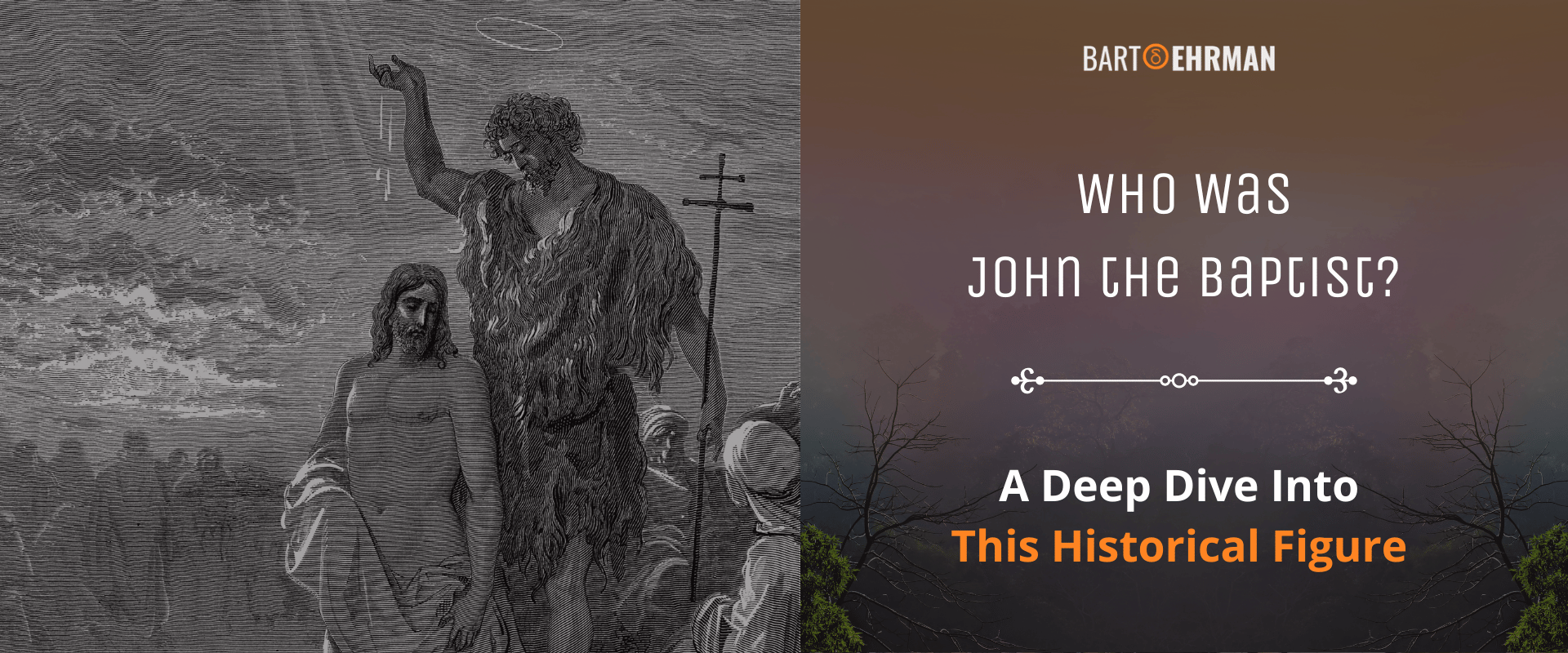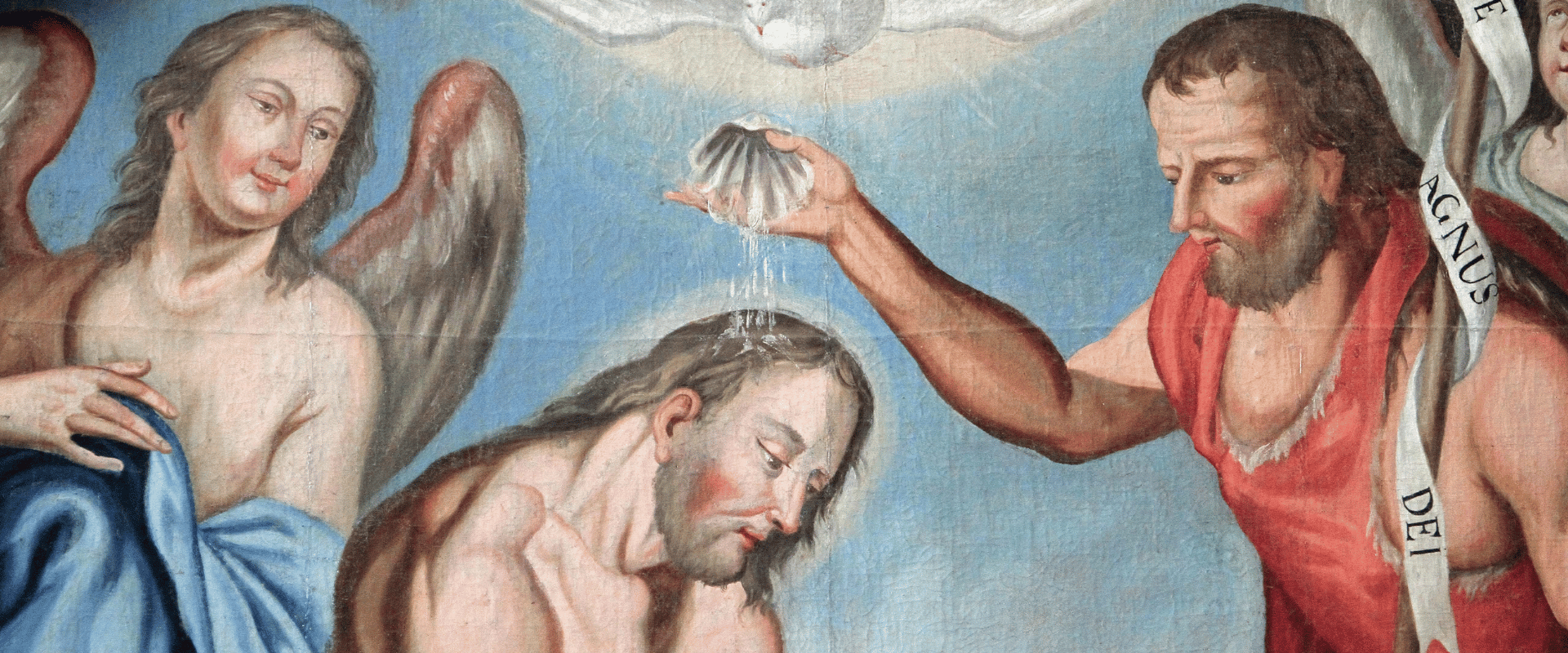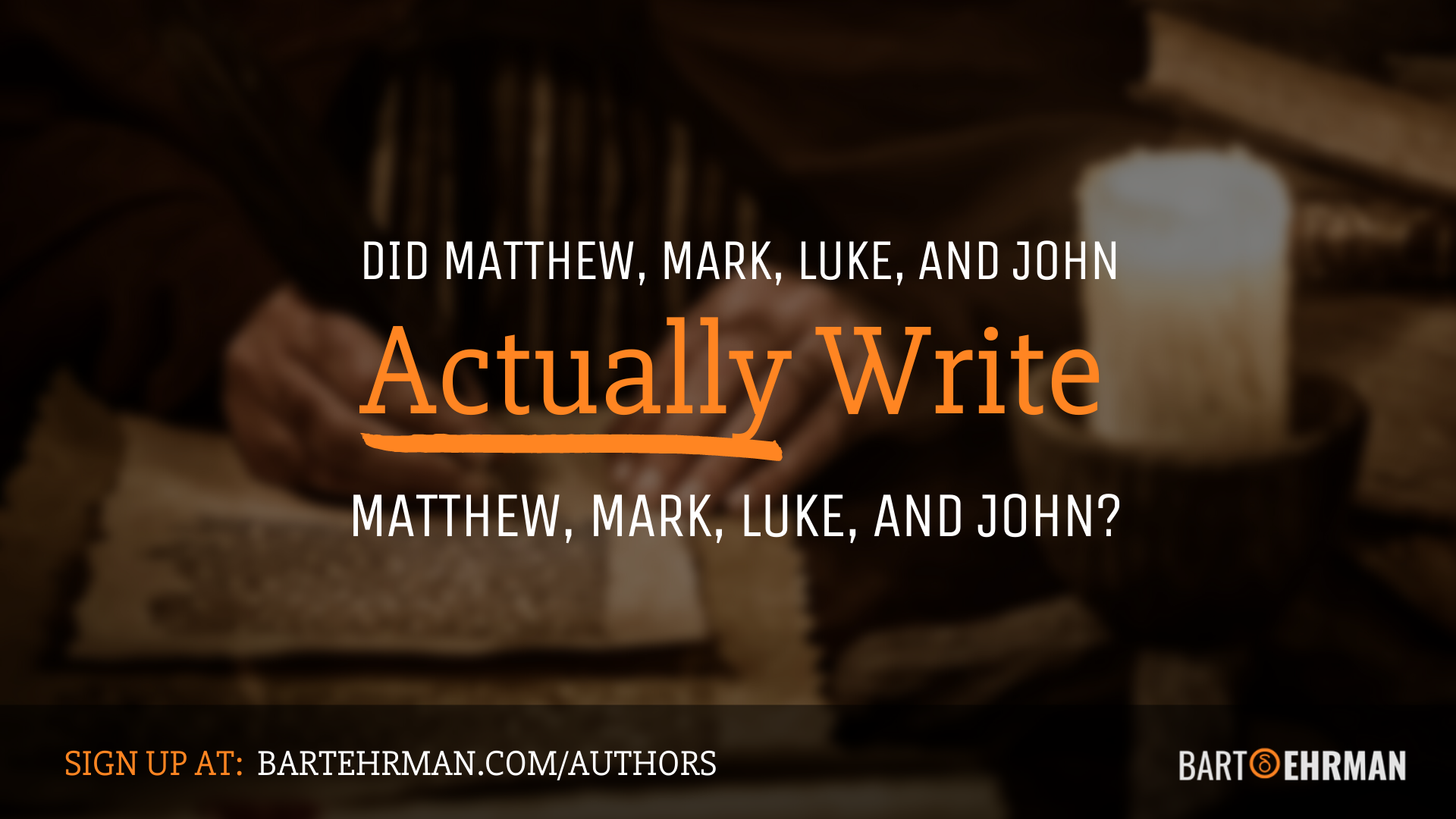Who Was John the Baptist? (The Untold Story)

Written by Joshua Schachterle, Ph.D
Author | Professor | Scholar
Author | Professor | BE Contributor
Verified! See our editorial guidelines
Verified! See our guidelines
Date written: July 26th, 2023
Disclaimer: The views and opinions expressed in this article belong to the author and do not necessarily match my own. - Dr. Bart D. Ehrman
If you’ve read the Gospels, you know John the Baptist.
According to the Gospels, God sent him to announce Jesus’ ministry. He baptizes Jesus, which prompts a heavenly voice to proclaim Jesus as the Son of God.
But there’s a lot more to the story.
And in this article, I’ll be answering the following intriguing questions:
- Why would John baptize a spriritually “superior” Jesus? Shouldn’t it have been the other way around?
- How likely is John’s strange birth narrative to be historical?
- Why was John killed?
- What sources do we have for John’s life outside of the Gospels?
- And how is it that long after his death, John the Baptist’s disciples continued his ministry? Shouldn’t they have followed Jesus instead?
In short, I want to uncover the lesser-known story about the historical John the Baptist’s birth, ministry, relationship with Jesus, and his death.

John the Baptist’s Story Starts with a Mysterious Birth
The Gospels view John the Baptist as a catalyst for beginning Jesus’ ministry. But John was apparently in the wilderness before Jesus arrived. Why was he there, and what was he doing?
Luke is the only Gospel to mention John’s birth. This was the story where, according to Chapter One, an angel appeared to Zechariah, a priest, and announced that he would have a son named John, who would play a significant role in preparing the way for the Messiah. John the Baptist’s birth story is also responsible for the tradition that Jesus and John are cousins although the gospel does not explicitly state that. Instead, it indicates that John’s mother, Elizabeth, and Mary, the mother of Jesus, were relatives. The exact nature of their relationship is not specified.
However, most scholars agree that Luke’s version is not a great basis for a historical reconstruction of John the Baptist’s life. The same is true of Luke’s claim that John and Jesus were related. In fact, it’s almost impossible to know the actual date of John the Baptist’s birth.
Nevertheless, it is clear that John was a contemporary of Jesus, possibly an older contemporary since his ministry started first. Scholar Joel Marcus says that the fact that John the Baptist baptizes Jesus indicates something interesting: Jesus was likely a follower of John the Baptist before beginning his ministry.
This possibility gives the Gospel writers a problem. If Jesus was superior to John, why did John baptize him and not the other way around? In Matthew 3:14-15, John protests, saying that Jesus should be baptizing him. Jesus explains that John should baptize him to “fulfill all righteousness.” I’ll say more about where John baptized Jesus in another post.
By the way, if you’re interested in learning more about the Gospels, join a free 50-minute webinar with Bart discussing the authorship of Matthew, Mark, Luke & John.
What Did John the Baptist Do? What Was His Ministry All About?
Matthew and Luke also give us a good sampling of John’s preaching (3:7-12). In one scene, John speaks passionately about the coming end of the world. He says that all who are not righteous will be burned “with unquenchable fire” (3:12). Hence, John the Baptist must have been an apocalyptic prophet.
In 1st century Palestine, where John the Baptist lived, apocalyptic worldviews were increasingly common. The main thrust of these views was that the world had been corrupted by sin. Therefore, God would soon intervene to punish the wicked and reward those who had been righteously faithful. This is clear in John the Baptist’s preaching in the Gospels.
But how can one become righteous enough to escape God’s wrath? This is where baptism comes in. The Gospels say that John’s baptism was to show repentance and have one’s sins forgiven (Luke 3:3).
An Intriguing Possibility: Who Baptized John the Baptist?
John the Baptist was an apocalyptic preacher for whom baptism was a central practice. Therefore, some scholars speculate that he might once have been a member of the Qumran community.
The people of the Qumran community are often identified as the Essenes. They were a group of Jewish separatists who chose to live in caves in a region between Jerusalem and the Dead Sea. They believed that much of the Judaism of their time was corrupt.
Consequently, they sought to practice their religion as strictly and correctly as possible. To this end, they practiced ritual bathing. Moreover, they believed in a final battle between good and evil in which God would triumph. Sounds familiar, right?
There is, of course, no way to be certain about John’s involvement with this community. It is an intriguing possibility, however. If true, it might answer a fundamental question: who baptized John the Baptist?
Another Source for John the Baptist’s Story
So far, we’ve only spoken about John the Baptist’s story as told in the four Gospels. However, there is another source from which we can draw.
Flavius Josephus was a Jewish author who wrote several influential historical works. He writes about both Jesus and John the Baptist. Like the Gospel writers, however, Flavius Josephus writes about them several decades after their deaths.
Josephus does not mention any connection between Jesus and John the Baptist. He either doesn’t know about it or doesn’t find it significant.
In his book The Jewish Antiquities, he writes about John’s preaching. John “commanded the Jews to exercise virtue, righteousness towards one another, and piety towards God” (18.117). This accords pretty well with Matthew’s and Luke’s descriptions. Where Josephus differs, though, is on the matter of John’s death.
How did John the Baptist Die?
Both the synoptic Gospels and Josephus say that a king named Herod Antipas killed John the Baptist. They differ, however, in the reasons for this killing.
In the synoptic Gospels, Herod arrests John for a very specific reason. Herod has married Herodias, the wife of his brother Philip, and John denounces him for this. Herod arrests John for his impudence and is tricked into beheading him by Herodias.
Josephus agrees that Herod Antipas married his sister-in-law. However, he says John the Baptist was attracting such large crowds that Herod feared John might foment a rebellion. He kills John, ultimately, for crowd control.
Josephus doesn’t explicitly say how John was killed. But since beheading was one of the more common methods of execution in 1st century Palestine, this is plausible.
Herod Antipas was a client king. This means that he only ruled with the permission of the Romans. Since Rome executed rabble-rousers like Jesus, most scholars agree that Josephus’ story makes historical sense.

Did John the Baptist Die Before Jesus? When Did John the Baptist die?
We can assume that John died before Jesus, following our sources. Scholarly consensus says that Jesus died between 30 and 33 CE. That would put John the Baptist’s death in the late 20s CE, according to Joel Marcus.
How old was John the Baptist when he died? We can’t know for certain. Nevertheless, if we again assume that John was a bit older than Jesus, we can speculate that he may have been somewhere around 30 when he died.
John the Baptists' Disciples
Surprisingly, the final chapter of John the Baptist’s story continues long after his death. It seems that John’s death did not stop his followers from continuing his legacy.
In Acts 19:1-7, Paul meets some disciples of John the Baptist. This was over a decade after Jesus’ death, so John had been dead even longer. Nonetheless, Acts indicates that people were still following the baptismal rituals taught by John.
In addition, an early Christian document, the Pseudo-Clementine Recognitions, speaks about followers of John the Baptist centuries after John’s death. These disciples of John claimed that he, not Jesus was the Messiah. Clearly, John had an enormous influence that long outlived him.
Scholarly Insights: The Curious Following of John the Baptist
According to the Gospels, John the Baptist purpose was to announce the coming of Jesus, "the straps of whose sandals am I am not worthy to untie." Additionally, the Gospels claim that after Jesus' baptism, God proclaimed from the sky that Jesus was his Son. John the Baptist is also on record telling Jesus "It is I who should be baptized by you." If the voice really came from heaven and John really recognized that Jesus was the Son of God, it seems strange, then, that he sent messengers in Matthew 11 and Luke 7 to ask Jesus, "Are you the one who was to come, or should we expect someone else?" Wouldn't it be clear to him by then?
It's also curious that John's disciples remained loyal to John's teaching and ministry after the events of the baptism. Many scholars, including Bart Ehrman, believe that Jesus was actually a disciple of John's. The baptism itself was probably historically insignificant but by the time the Gospel writers recounted the story, they had either inherited - or they invented - the voice from heaven and dialogue between Jesus and John which made Jesus out to be the superior individual rather than "just" a disciple of John. This best explains the fact that John the Baptist had followers long after his death.
Related Articles
Conclusion: What Can we Know about John the Baptist?
John the Baptist was a contemporary of Jesus of Nazareth. He may have been a community member at Qumran before striking out on his own. His community of followers likely included Jesus, whom he baptized.
He was quite popular in Palestine. His brand of apocalypticism resonated with the people living under the yoke of Roman rule. The client king, Herod Antipas, killed him, likely because his popularity posed the threat of large-scale rebellion. Nevertheless, after his death, his community continued for centuries.
FREE COURSE!
WHY I AM NOT A CHRISTIAN
Raw, honest, and enlightening. Bart's story of why he deconverted from the Christian faith.
Over 6,000 enrolled!

